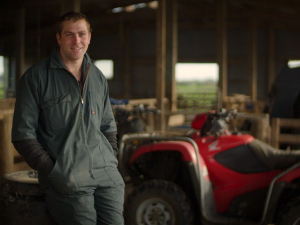ACC backs young farmers with FMG Young Farmer of the Year partnership
The Government has announced that ACC will be a sponsor of this year's FMG Young Farmer of the Year competition.
 Sam Hodsell 50/50 sharemilks with his partner Jenna for his parents Craig and Gaewyn on the 250 hectare family farm at Taramoa in Southland.
Sam Hodsell 50/50 sharemilks with his partner Jenna for his parents Craig and Gaewyn on the 250 hectare family farm at Taramoa in Southland.
Sam Hodsell, the 2021 Otago-Southland FMG Young Farmer of the Year, says it’s critical to identify and manage workplace risks on their farm – but he and his family are also actively putting tangible measures in place to help protect people if someone does make a mistake.
“For instance, we’ve recently purchased and had big red buoys screwed onto all our irrigation pipes,” says Sam, who 50/50 sharemilks with his partner Jenna for his parents Craig and Gaewyn on the 250 hectare family farm at Taramoa in Southland.
“That was learning from a near miss and we wanted to make sure the pipes were highly visible and they certainly are now. We have also benefited from productivity gains due to saving time looking for lost pipes.”
Sam sourced the buoys from New Zealand CeeMee company, which sells innovative farming safety solutions. The Hodsells are now also looking at installing rollover crush protection on quad bikes.
“My parents have always been very aware about health and safety,” says Sam.
“Growing up, I learned a lot from seeing the measures my dad put in place on farm.
“We have a health and safety plan, training register and incident report. We used online templates provided by farming industry organisations to draw those up and it was pretty straightforward. We sat down as a team and identified our risks and talked about how we could manage, minimise or eliminate them.
“Identifying and managing risk is also ongoing. For instance, one of our critical risks is working with large animals. We provide training for our people, to make sure they have the skills to safely do all aspects of their work. With livestock that includes training people to work in safe ways around animals and also how to read an animal’s behaviour. However, we recognise that it takes a long time to pick that up.”
Fatigue has also been identified as a critical risk on farm and over the past two years, Sam and Jenna have increased their staff numbers to help address that – with resulting benefits.
“Fatigue is one of the biggest risks from my point of view,” says Sam.
“Employing extra staff means more of the workload is shared. We talk with people about how they are feeling, and if they are tired, I will say go home and get some rest. I know if I’m feeling tired or under the weather, I don’t do the best job and there’s a risk of taking shortcuts. I don’t want anyone working if they are feeling like that.”
Agrisea NZ has appointed Craig Hudson as it's new chief growth officer.
State farmer Landcorp, trading as Pamu, is a forecasting a full-year net profit of around $100 million.
Tony Aitken, chief executive of Ruralco, has been awarded the Excellence in Business Leadership Award at the ANZ Business of the Year Awards.
Global trade has been thrown into another bout of uncertainty following the overnight ruling by US Supreme Court, striking down President Donald Trump's decision to impose additional tariffs on trading partners.
Controls on the movement of fruit and vegetables in the Auckland suburb of Mt Roskill have been lifted.
Fonterra farmer shareholders and unit holders are in line for another payment in April.
OPINION: Staying with politics, with less than nine months to go before the general elections, there’s confusion in the Labour…
OPINION: Winston Peters' tirade against the free trade deal stitched with India may not be all political posturing by the…